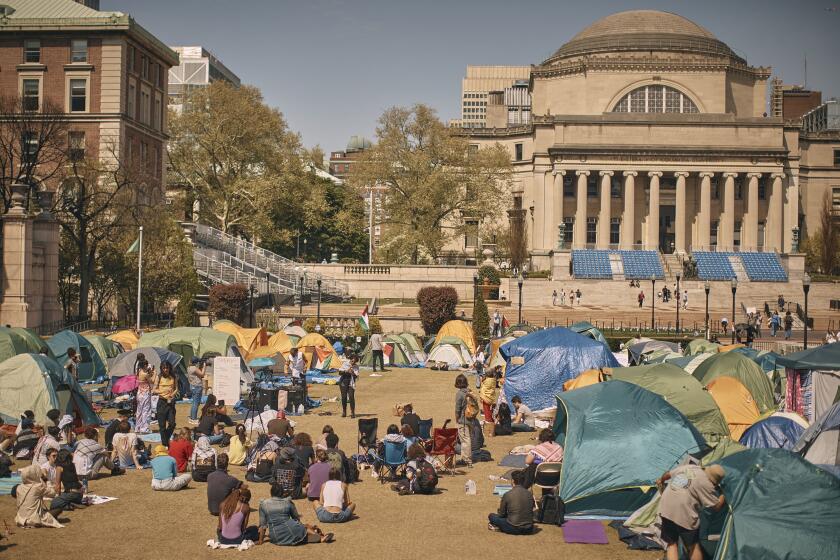A Teacher Fights Social Darwinism in the Public School Trenches : Education: The rewards of arousing self-esteem overcome the lure of aiding the privileged.
The public school system is sinking, and I’m clinging to the wreckage.
I’m a sixth-grade teacher in a district that can meet its payroll only by lopping 12% off our salaries. This cut will cause some teachers to lose their homes and cars. A strike looms in February unless $300 million can be found. Where will it come from? Will there be an 11th hour bailout? Uncertainty clouds the air.
As the second-largest school district in the country lists and breaks apart, City Hall and Sacramento are conspicuously quiet. Mayor Tom Bradley is in a terminal state of lassitude, which is odd, considering that a school shutdown could well lead to more blood in the streets. Gov. Pete Wilson, last seen getting battered on Election Day, has also abdicated. Faced with both this appalling lack of political leadership and dwindling state revenues (thanks to Proposition 13 and its criminal redistribution of wealth) the two sides in the school crisis--the school board and the teachers’ union--can only taunt and threaten. And as they do, we, Los Angeles’ teachers and students, drift further downstream toward the precipice.
At the beginning of the school year, I could sense the impending danger and, like many other teachers, I thought of fleeing. I sent out resumes to private schools, and, being the recipient of a number of teaching awards over the years, I had no lack of responses. I took a few days off and visited cushy campuses atop Mulholland Drive. I spent a morning at an elementary school that does not admit anyone with an IQ under 140. I toured a carpeted fifth-grade classroom where there were more terrariums than students. At another campus, I sat in on a history of India class and watched as the coddled children of movie stars and plastic surgeons yawned through the battle between the Buddhists and Hindus.
A headmaster with a German accent asked what I make.
“Thirty-eight thousand--before the pay cut,” I said.
“Oh, we can match that,” he said. I had the feeling that the job was mine if I wanted it. I said I’d think about it.
As I descended from this preppy aerie, I thought about classes with 17 kids and air conditioning and money for special projects and having my room swept (or vacuumed!) every day. I thought about teaching the kids of L.A.’s movers and shakers, kids with computers and stratospheric IQs and bedrooms chockablock with books.
But then a funny thing happened. I began to think about the kids in my class at Hancock Park Elementary, many of them immigrants, some who don’t speak English, others who eat breakfast and lunch in the school cafeteria because their parents (or parent) can’t provide hot meals at home. And I realized that as a teacher in a public school, part of my job is to make my students feel special, feel as though they have something to contribute, feel that there is reason for hope. Many of them don’t get this feeling of specialness at home. Or even if they do, it vanishes in a world that tells them otherwise. But they believe me when I tell them that their essays or art projects are wonderful. They swell with pride when I ask them to teach a math lesson in their native languages.
At private schools, there’s no necessity to bolster the self-esteem of the students. It would be redundant. Coming from where they do, and by virtue of attending an elitist institution, these kids know they’re special. They don’t need me. Most of them are going to get where they want to go with or without me.
But my students do need me. Because what I give them, indeed, what tireless and courageous teachers give to students all across this desperate city, the students can get nowhere else. You see, in the new dynamic between teachers and students, the emotional stakes have been raised. Public school teachers are no longer just helping kids learn how to read and write and multiply and divide, we’re also trying to confound the laws of social Darwinism. That is, we’re taking society’s weaklings and we’re trying to help them survive. How can I flee, given these circumstances?
And so while the district and the union trade punches, while Bradley and Wilson snooze, while dust balls blow through the dingy halls, while we run short of paper and pencils and while the fluorescent bulbs flicker, I’ll continue to cling to the wreckage until there’s no alternative but to desert the sinking ship.
More to Read
Start your day right
Sign up for Essential California for news, features and recommendations from the L.A. Times and beyond in your inbox six days a week.
You may occasionally receive promotional content from the Los Angeles Times.






